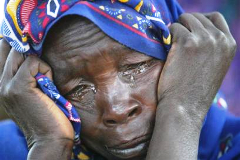British envoy vows to help implement Sudan peace deal
KHARTOUM, March 21 (AFP) — Britain’s special envoy for Sudan pledged his country’s help in implementing a landmark January peace deal between the Sudanese government and southern rebels.

Alastair McPhail also called on rebels in the embattled Darfur region of western Sudan to resume peace negotiations without pre-conditions.
“For a variety of reasons, implementation has not gone as fast as the Sudanese people would have preferred or expected, and this we would like to see too,” Alastair McPhail told a Khartoum press conference.
“It is for the Sudanese people to impose peace themselves … (but) we can help, we can support and we can advise,” he said.
“Peace isn’t just an absence of fighting … peace is something more and this requires cooperation not just by the government and SPLM but all of the stakeholders in the Sudan,” he added, referring to the Sudan People’s Liberation Movement (SPLM) led by John Garang.
“There will be a lot of challenges, a lot of work to be done during the six-month pre-interim period,” McPhail said, pointing to the need, among other things, to draw up a transitional constitution.
Garang and Sudan’s Vice President Ali Osman Taha signed a peace deal in Nairobi, Kenya on January 9 that formally ended 21 years of war.
The pact ushered in a six-month pre-interim period during which both sides are to carry out preparations before the official six-year transitional period starts, when the south begins running its own affairs.
The war in the south erupted in 1983 when the rebels, led by Garang, rose up against Khartoum to end Arab and Muslim domination and marginalization of the black, animist and Christian south.
While religion fuelled the conflict, vast reserves of oil, mostly in southern Sudan, played an increasingly dominant role in the war that claimed at least 1.5 million lives and left more than four million others homeless.
McPhail also urged rebels in Darfur to go back to the negotiating table without pre-conditions.
“We have called on all parties to live up to their commitment to the ceasefire and to cooperate with the African Union,” said the envoy, adding that this was the “consistent” message they delivered to the rebels.
Violations of an April 2004 ceasefire by the Sudanese government, its militia allies, and the Darfur rebels led to the collapse of peace talks in Abuja, Nigeria, in December.
The Abuja talks — the only direct negotiations between the Sudanese government, the Justice and Equality Movement (JEM) and the Sudan Liberation Movement (SLM), organized under the auspices of the African Union — have yet to resume, despite a recent announcement from Khartoum that the process could restart.
“We have called upon the (rebel) movements to engage seriously, at senior levels, in the negotiations.
“So long as there are negotiations there is no need for fighting and there is no need to pursue political ends by violent means,” McPhail said.
He said he had urged SLM and JEM leaders in recent meetings to “attend future negotiations without pre-conditions, at the right seniority with the required mandate to negotiate”.
The government crackdown on an uprising launched by rebel groups in Darfur two years ago has caused what the United Nations has described as the world’s worst continuing humanitarian crisis, with tens of thousands dead and 1.6 million people displaced.
